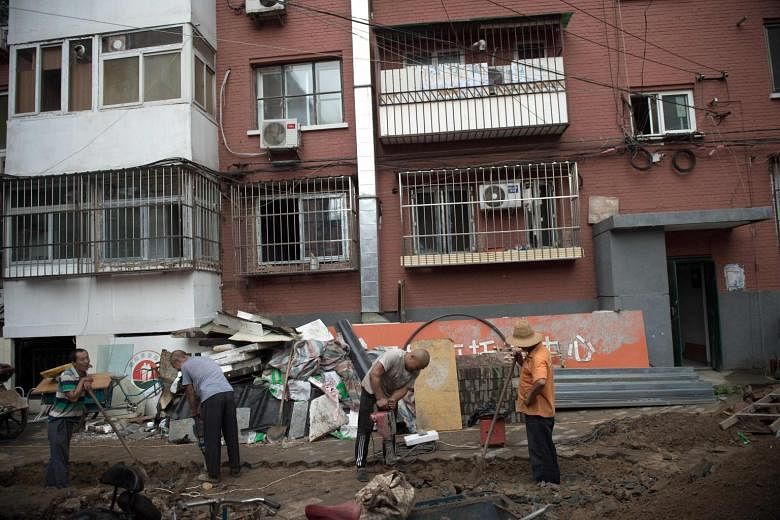HONG KONG (REUTERS) - Beijing wants more people to rent. More leases and fewer mortgages could put China's overheated property sector on a more sustainable footing, plus increase economic efficiency.
But the initiative is pitted against social prejudice and commercial interests, and it might entail an economic sting. Officials will struggle to administer this medicine.
It's no small irony that the Chinese Communist Party, which rallied peasants to murder millions of landlords under the leadership of Mao Zedong, is trying to revive this social class.
Indeed the government is going into the business itself, buying empty apartments and flipping them into low-income units: such purchases comprised 18 per cent of sales in 2016.
Officials are also requiring some new land to be dedicated to rented buildings. Developers are climbing aboard. China Vanke , for example, aims to add 150,000 leased units in the coming two years.
The macroeconomic benefits of rental markets may be subtle, but the danger of excessive real estate investment is obvious - it often precedes a financial crisis. In China, the growing gap between income and house prices is triggering concern at the highest level; President Xi Jinping warned that houses are for living, not speculation, in a December speech. The pro-rental campaign followed.
A typical two-bedroom new apartment in Beijing now costs around US$900,000 (S$1.2 million), according to Fang.com, China's biggest real estate website. The average resident earns US$16,000 a year. Similar ratios are found throughout economically dynamic mainland cities.
Even so, people keep buying, although down-payments alone can erase an extended family's savings - part of the reason the country has such a high savings rate.
The so-called "ant tribe" was born from this disparity: a vast swarm of dispirited college graduates hived in windowless warehouses, slaving to save for a deposit.
The ants are marching into banks too. Household leverage - mostly mortgages - has risen to 42 per cent of gross domestic product, according to Moody's. That's manageable, but as flats demand a bigger share of incomes, they cannibalise funds from shopping budgets in an economy where consumption's share of GDP has fallen to an extraordinarily low 37 per cent.
If the government wants China to become a developed consumer economy - and it very much does - it will need to lift that ratio a whopping 23 percentage points to catch up to the World Bank developed average.
HOUSING AS A SERVICE
Healthy rental markets appear to correlate roughly with economic development - perhaps because they indirectly indicate how good a society is at enforcing contracts. More than one in three American households rents; nearly half of Germans lease; more than half of the Swiss do. Rental ratios below the 30 per cent continental average are concentrated in weaker economies like Spain, Greece, and Portugal.
In China, only 9 per cent of urban residents lease their quarters, according to the Chinese Academy of Social Sciences - extreme even compared to high ownership rates found in post-communist Eastern Europe.
This is particularly inefficient as many cities host decades worth of unsold inventory, plus apartments that were sold but left empty: the lack of property tax means there's no cost to holding property vacant.
Flushing this space onto the market would generate recurring income for owners, and put downward pressure on rates, relieving poorer tenants.
Renting also facilitates labour mobility, which China needs, not only for millions of laid-off industrial workers that need to get out of the rust belt, but also for skilled labour. As it is, human capital is concentrating in a few megacities, held in place by hefty home loans. This increases wage bills for employers, and exacerbates regional imbalances.
UNSAFE AS HOUSES
Even so, pushing quickly will provoke a backlash. Final demand from real estate contributes between a quarter and a third of China's GDP, mostly driven by new housing development - not leasing.
When home prices retreated in 2014 and 2015, economic performance wobbled. If the rental campaign actually reduces speculation, and house prices fall as a result, the economic impact could be severe.
Local governments will resist. They depend on land sales for revenue, and many are stout defenders of the "hukou" residence-permit system, which excludes migrants from urban services like health and education - unless they buy property.
Banks are exposed through mortgages, loans to developers, and the construction industry. Real estate supports other lending too: Moody's reckons property was the collateral behind more than 43 per cent of bank loans in 2015.
SOCIAL PREJUDICE
Society, however, is the biggest impediment. Many parents won't let daughters marry men who haven't bought a house yet. It is the young, the poor, the foreign and the flaky who sign leases. Nearly 70 per cent of average household wealth in China is property.
Given the volatility of the stock market, no other asset class has paid off so consistently for ordinary people. They believe it is the only responsible place to put their money. Only an epic crash might persuade them otherwise. Until then, they will remain reluctant to rent.

